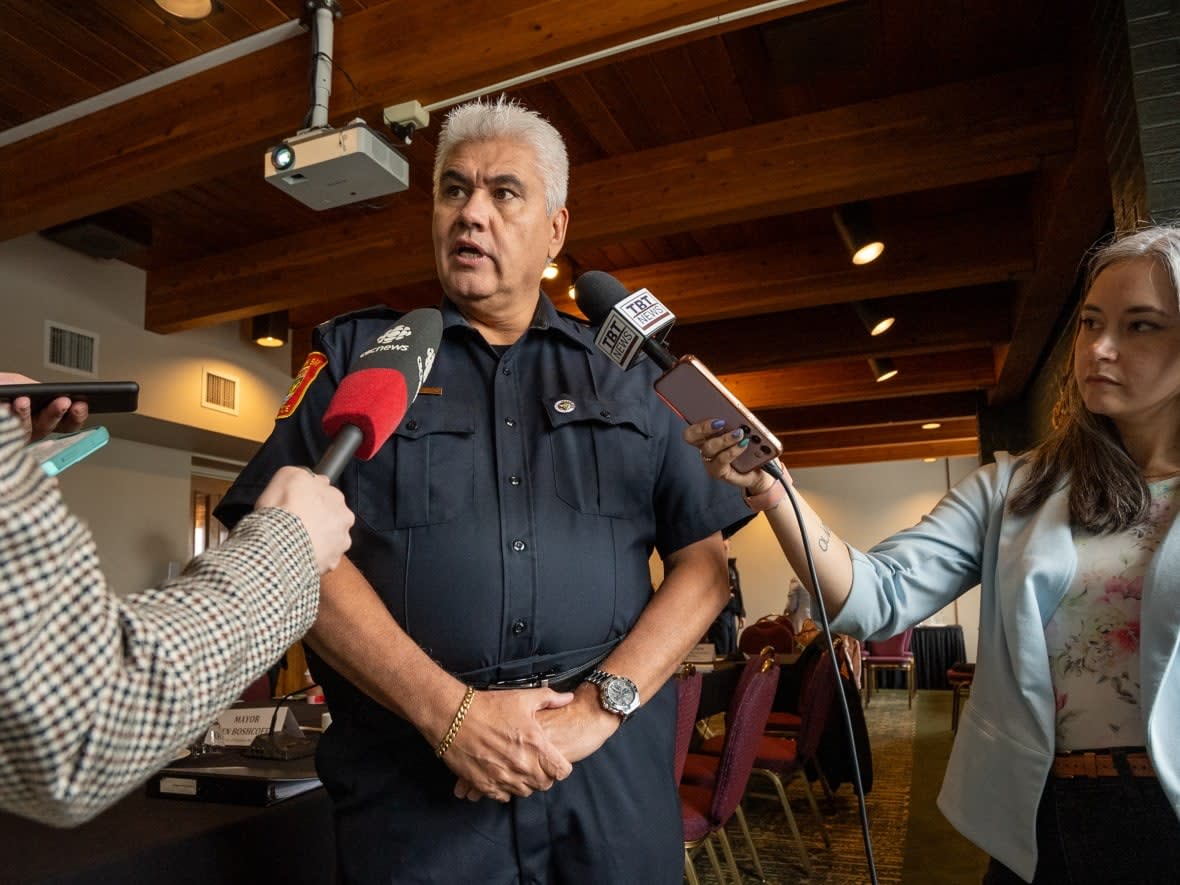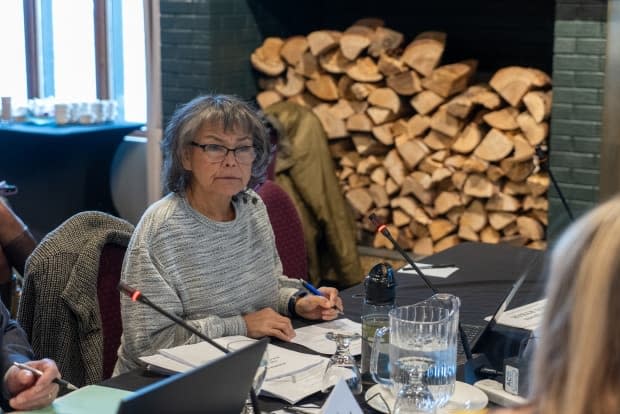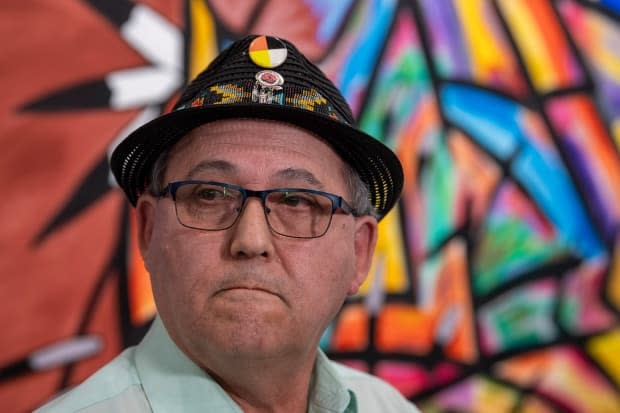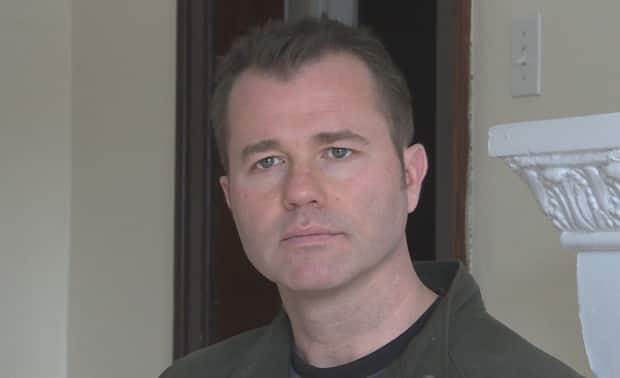Chief of Thunder Bay's embattled police force notes families' 'pain and suffering' but says change takes time

Amid calls for the Thunder Bay Police Service (TBPS) to be disbanded, its police chief says much work to rebuild community trust has been done, but it'll take time to address outstanding concerns.
Chief Darcy Fleury spoke to the media following the police oversight board's monthly meeting on Tuesday afternoon, a day after First Nations leaders, Kiiwetinoong MPP Sol Mamakwa and family members of Indigenous people who recently died in Thunder Bay addressed a news conference at Queen's Park.
They called for the TBPS to be disbanded and for an outside police service to investigate the deaths of Corey Belesky, Mackenzie Moonias and Jenna Ostberg.
"We continue to share their [the families'] pain and suffering and understand that [these are] very difficult times," Fleury said.
As progress is made in each death investigation, he said, police will meet with the families as is appropriate.
These latest developments come after Ontario Provincial Police (OPP) announced they had laid multiple criminal charges against the former police chief, the former police service lawyer and a staff sergeant.
Service is 'doing the best we can,' Fleury says
On Monday, Nishnawbe Aski Nation Grand Chief Alvin Fiddler called the police service a "cold case factory" when it comes to investigating the deaths of Indigenous people.
Fleury said those comments are "a bit of dramatization."
He said police services across Canada have cold cases and Thunder Bay is no exception. However, he remains confident the service is "doing the best we can to ensure that everybody's being protected and getting the services that they need."
WATCH | What's behind the calls for Thunder Bay's police service to disband:
Fleury was sworn in as the city's police chief about a year ago. Since then, he said, much work has been done to increase community engagement.
Both the city's police service and oversight board have received hundreds of recommendations in recent years. According to the TBPS, they include ways to break barriers that "exist between Indigenous, other racialized people and the justice system which includes police."
On Tuesday, Fleury said the new Indigenous advisory committee and elders committee, and a diversity committee now underway, are significant developments.

The police chief said 60 per cent of the recommendations in the 2018 Broken Trust report, which found evidence of systemic racism within the force, have been addressed; the rest of the recommendations require annual reports, so they are being addressed on an ongoing basis.
"We have some really good progress and we're continuing to strive to continue to get all of those things done as they go along," he said.
Karen Machado, chair of the Thunder Bay Police Service Board, reiterated the message that change takes time.
"The work we have to do and the building back of trust, it doesn't just happen; it's also actions. Policy, we can develop them all, but we need to be accountable," Machado said.
The police oversight board is tracking progress made on the recommendations received on its website.
Congress of Aboriginal Peoples voices concerns
The Congress of Aboriginal Peoples (CAP) issued a statement Tuesday calling for "an immediate and in-depth investigation into the actions of the Thunder Bay police" in regards to the deaths of Belesky, Moonias and Ostberg.
CAP is one of five national Indigenous representative organizations recognized by the federal government.
"The Thunder Bay police have a long history of racism and bias towards Indigenous Peoples," Kim Beaudin, CAP's national vice-chief, said in the statement. "It's obvious their attitudes and prejudices are spilling over into their day-to-day work and that needs to stop immediately — it's costing lives."
CAP's national chief, Elmer St. Pierre, said it's crucial to support the families of those who have died during this time.

"If we're going to all move forward in the spirit of reconciliation, police have to immediately change their toxic attitudes and be held accountable for any misconduct," St. Pierre added.
Fleury said it is difficult to comment on CAP's statement at this time due to the nature of the ongoing death investigations.
"I have reviewed those investigations. I have gone through briefings with the officers to see where we are, and I'm satisfied that they've done a really good job, and I think we can answer those questions when the time's right."
Previous calls to disband TBPS
The decision about whether to disband the TBPS is in the hands of Ryan Teschner, Ontario's inspector general of policing. The position, created last year, is defined in the new Community Safety and Policing Act that took effect April 1.
If Teschner determines the police service and/or its oversight board should be dissolved, he would make that recommendation to the attorney general, said Michael Kempa, an associate professor of criminology at the University of Ottawa.
Given that all the right players are now in place with that new legislation, the inspector general's office and so forth and new chief, let's give it one last try over that year. Once you disband the police service, it's very difficult to go backwards; it's sort of a final choice.
- Michael Kempa, University of Ottawa, associate professor of criminology
While the process looks different under the new regulations, it's not the first time the TBPS has faced calls for it to be disbanded, as NAN leadership made a similar recommendation in 2022.
"This inspector general, I think, will basically come in and say, 'No need to reinvent the wheel here,'" Kempa said.
"'We know what the recommendations are. Have you implemented them? And if not, I'm giving you a timeframe for action.'"
He said if the decision is made to disband the TBPS, it's likely it would either be replaced with an entirely new service or be taken over by Ontario Provincial Police, he said.

While Ontario's inspector general of policing weighs what to do, NAN has recommended a combination of the OPP and a First Nations-led policing force in the interim.
When asked whether he thought the force should be disbanded, Kempa said the new police chief should be given another year to make changes.
"Given that all the right players are now in place with that new legislation, the inspector general's office and so forth and new chief, let's give it one last try over that year.
"Once you disband the police service, it's very difficult to go backwards; it's sort of a final choice."

